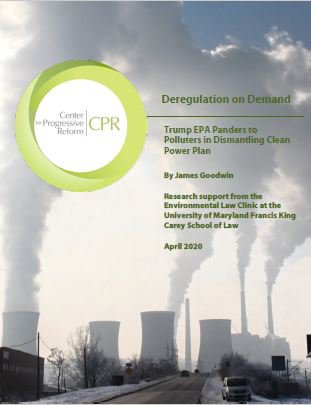
UPDATE (4/29/20): CPR's Deregulation on Demand paper was recently cited and discussed in an amicus brief filed by Sens. Whitehouse, Merkley, Gillibrand, Schatz, and Markey supporting a case against the ACE rule (American Lung Association v. EPA). You can read the brief here.
Who does the Environmental Protection Agency (EPA) work for? The answer would seem to be us, the American public, given that the statutes it is charged with implementing are focused first and foremost on protecting our health and the natural environment we all depend upon. The Trump administration, however, has transformed this critical protector agency into a powerful of tool of corporate polluters, one dedicated to fattening these industries’ already healthy bottom lines at the expense of the broader public interest.
The evidence of this brazen degree of corporate capture at the Trump EPA abounds. The upper echelons of the agency’s leadership are littered with former lobbyists and corporate officers once associated with the very businesses they are now supposed to be regulating. The EPA’s anti-safeguard agenda – already noteworthy for being one of the most aggressive in an administration that has made attacks on public protections a top priority – has been quite literally dictated by corporate interests through the use of “hit lists” of existing regulations that industry polluters want to see repealed or weakened.
A new paper, Deregulation on Demand: Trump EPA Panders to Polluters in Dismantling Clean Power Plan, out today from the Center for Progressive Reform (CPR), adds to this mounting evidence. Unlike previous research on this topic, our paper sets out to examine the extent to which relevant corporate interests are dictating the content of the agency’s individual anti-safeguard actions. Specifically, the paper explores this question by looking at one particularly contentious Trump EPA rollback, the Affordable Clean Energy (ACE) rule. The ACE rule repealed the Obama administration’s Clean Power Plan, which established first-time limits on greenhouse gas emissions from existing fossil-fueled power plants, and replaced it with a new program that would deliver little, if any, emissions reductions at all.
The goal of this paper was to quantify how much of industry’s wish list had been delivered in the final ACE rule. To do this, I worked with student attorneys at the Environmental Law Clinic at the University of Maryland Francis King Carey School of Law to examine the public comments that a sample of relevant national trade associations submitted regarding how greenhouse gas emissions from existing fossil-fueled power plants should be regulated. We then compared these comments to the provisions contained in the final ACE rule to determine how much of industry’s feedback had been reflected in the rule’s provisions.
Through our research, we identified a total of 23 unique substantive requests, or “asks,” in the trade associations’ public comments and concluded that the Trump EPA incorporated 79 percent of them into its final ACE rule. This high percentage is suggestive of how unduly attentive the Trump EPA is to the very industries it is supposed to be regulating, and thus raising the question of whether the agency is faithfully carrying out its public-minded statutory mission.
While the Trump administration did not invent corporate capture of protector agencies like the EPA, these numbers suggest that corporate interests are enjoying an unprecedented degree of influence over how our laws are being implemented. This should be of grave concern to all of us. For one thing, the compliance costs that industry is saving by blocking and weakening rules are not just disappearing into the ether. Rather, they are being transferred onto all of us in the form of preventable deaths, increased cancer rates, lost school days, and degradation of our cherished environmental heritage. Worse still, these costs will be disproportionately borne by those who can least afford them, including the poor and people of color.
For another thing, when agencies become overly influenced by the industries they regulate, they risk undermining their credibility and the legitimacy of the policies they create. The current COVID-19 pandemic illustrates the longer-term costs that can result when the public loses trust in our governing institutions. Our response to this catastrophe has become hampered because members of the public are not taking seriously the advice of public officials to prevent unnecessary exposure to this harmful virus, contributing to its rampant spread. It will be impossible to restore the public’s faith in the EPA and other protector agencies unless and until the worst vestiges of corporate capture have been rooted out.
In the meantime, the courts offer a first line of defense against corporate capture. For example, the problems with the ACE rule identified in this paper – namely, the undue attentiveness that the Trump EPA gave to corporate interests in crafting the rule’s provisions – potentially make it ripe for judicial rejection as an “arbitrary and capricious” action under the Administrative Procedure Act. To get at the root of the problem of corporate capture at the EPA, structural reforms will be necessary. These include measures aimed at limiting conflicts of interest among agency leadership.
I will continue to work with the Maryland Environmental Law Clinic to track such instances of corporate capture at the EPA. In a subsequent report, we will examine industry influence over a broader range of Trump anti-safeguard initiatives, including measures that would undermine critical protections designed to keep our air safe to breathe, our drinking water free of contaminants, and our communities free of toxic chemicals. Stay tuned.
You can find Deregulation on Demand: Trump EPA Panders to Polluters in Dismantling Clean Power Plan, along with a chart documenting our detailed supporting analyses of industry comments, on our website.